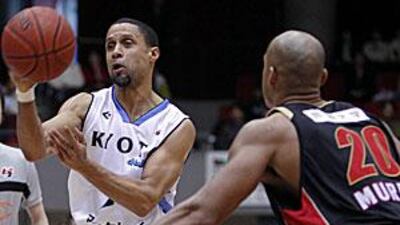Two important things have not changed for Mahmoud Abdul-Rauf in the 14 years since he set off a firestorm of criticism by refusing to stand for the US national anthem before NBA games. He is still a devout Muslim. And he is still playing basketball. He is plying his trade in Japan, the latest stop of a globe-trotting career that became necessary in the aftermath of being booed, inundated with hate mail and suspended by the NBA for refusing to stand for The Star-Spangled Banner in March 1996.
"It was close to impossible to play in the US after that," says Abdul-Rauf. "The doors were shut, but I said the NBA wasn't the only show in town and I was going to make use of my God-given talent even if it meant playing in Timbuktu." He has found his latest haven in Japan's fledgling professional league, where he is settling in with Kyoto Hannaryz, an expansion team, as the highest-profile player in the league's five-year history.
Kyoto's 14-26 record and two recent losses to the three-time champion Osaka Evessa underscore the challenges faced by Abdul-Rauf and his teammates. "Whether things are going well for us or not it's just a question of being consistent, constantly chipping away and not allowing others to dictate what we do," he said. The 41-year-old guard has certainly shown the willingness to stand up to those who would impose their will on his.
Abdul-Rauf, then known as Chris Jackson, was a two-time All-American at Louisiana State University before being taken third overall in the 1990 NBA draft by the Denver Nuggets. He converted to Islam a year later. "I had a lot of questions with my Christian background while growing up," Abdul-Rauf said. "I felt like I was being someone I wasn't meant to be." Abdul-Rauf was consistently among the Nuggets' best players, and narrowly missed setting an NBA record for free-throw percentage when he shot 95.6 per cent during the 1993-94 season.
He was having his best season in 1995-96, averaging 19.2 points and 6.8 assists per game, when his career changed for ever after he stopped standing for the national anthem, saying it conflicted with his Muslim beliefs. The Denver media picked up on it and, when the team played at Chicago, fans booed and jeered him. The scrutiny intensified. The NBA suspended Abdul-Rauf, but the ban lasted only one game. He and the league reached a compromise that allowed him to stand but close his eyes and pray during the playing of the anthem.
That did little to satisfy those who questioned his patriotism. Abdul-Rauf was traded to Sacramento in the off-season and played for the Kings for two seasons. He then played in Turkey in 1998-99 before returning for his final NBA season with Vancouver's Grizzlies in 2000-01. The anthem stance seemingly took a toll as his numbers declined each of his final three years in the NBA, and he never quite lived up to the expectations of being a No 3 pick.
Since then, the native of Gulfport, Mississippi, has been inactive or played overseas, with stops in Russia, Italy, Greece and Saudi Arabia. "I feel like I could live anywhere, not necessarily in the States," Abdul-Rauf says. "I'm the type of person who could pick up his bags and go live anywhere and I'm not going to miss anything." His one-year contract with Kyoto came about when the team's coach, David Benoit, the former NBA player, called to say he would like to have him on the team.
Benoit played against Abdul-Rauf in college and in the NBA and knew the veteran would bring a lot to the expansion team. "His experience is the most important thing," Benoit said. "He wants to go out and play ball like he did a few years back and it's exciting to see a guy his age still do it." After a hamstring injury early in the season, Abdul-Rauf is settling in, averaging 16 points a game. "I'll play as long as God gives me the ability and the strength," he says. "Right now I have my health and am still competitive. So as long as I have the combination of those two things I will still play and afterward, I'll look to coach."
One thing Abdul-Rauf knows, he will continue to practice his faith. "I have no regrets [about converting to Islam]," he said. "It was the best decision I ever made in my whole life. It's a great gift." * AP

